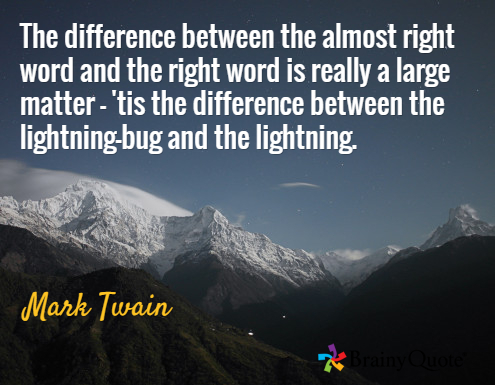Lightening and the Lightening Bug
0 comment
I have always appreciated the power of language and words and therefore, the importance of always choosing the right word. That said, I am grateful that, as an American, I did not have to learn the 400 plus words for snow that every Scot has to learn, as that may be a precision beyond even my interest. But as we struggle to build a society that is inclusive and welcoming, we must pay attention to the language we use.

For some time, there has been a movement to use asset-based language rather than deficit-based language. Thus, rather than talking about problems, obstacles and negatives, we talk about aspirations, tangible goals and positives. Out go programs to reduce high school dropout rates, in come programs that work to set graduation dates and create paths forward to that date. Out goes jobs training for the under- and unemployed, in come programs to secure independence, financial stability and building citizens who can contribute to the public good.
We eliminate the language that beats everyone over the head each time they read or say it, pointing the finger at them for putting themselves in this position and constantly reminding them of the negative and replacing it with language that inspires a path forward toward positivity. This isn’t Pollyanna stuff; this is using words to drive the outcomes we want.
Many years ago, nonprofits started moving away from referring to clients as “poor,” electing instead to use words like underserved or marginalized. While all these words are used to describe individuals and groups, there is a very big difference in connotations between the former one and the latter two. Poor describes the individual or community and suggests that s/he/they failed to not be poor. It clearly points the finger at person’s failure.
Underserved and marginalized, however, speaks to society’s failure, not an individual’s. Society failed to provide sufficient services to groups of individuals and nonprofits are stepping in to redress that situation. Society marginalizes people for a variety of reasons, and nonprofits are working to change that behavior. Despite the differences in these words, they have one big thing in common: they all come out of a deficit mentality.
Are people homeless because of something they did wrong or because society has failed to provide affordable and accessible housing for all? Granted, it is easier to refer to someone as homeless (one word) than someone who does not have access to affordable housing (eight words). Which provides our clients with dignity and which offers the opportunity for change?
We must think carefully about the language we use to describe our clients, ourselves and others. We must think about the goal we are trying to achieve with our words.
When shortly after Kamala Harris was selected by Joe Biden to be his running mate, she was referred to as someone “well-spoken.” Not particularly high praise for a lawyer, a former state Attorney General, a current US Senator, let alone someone who is all three of those descriptors. In fact, if Kamala Harris weren’t an African-American and South Asian-American woman, no one would have bothered to comment on her speaking ability; well-spoken would be the unquestionable expectation. Our words, and the inferences people will draw from those words, reveal who we are and what we value.
As we work to be a truly diverse and inclusive organization and society, each of us, as individuals and as organizations, must carefully choose language that doesn’t disparage and dehumanize, that doesn’t reinforce stereotypes, that doesn’t allow the divide among us to continue.
If this means we must take more time to think before we speak, take more time and read multiple drafts of what we write each time with a different lens, then so be it. If we must be constantly on the lookout for our implicit biases showing through in our speech and writing, in our print materials and on our websites, in our word choices and our pictures, then it is past time for us to slow down to get it right.
It doesn’t matter how good our work may be, if we disparage others in telling the stories of our work, we eviscerate the goodness of our work.
The opinions expressed in Nonprofit University Blog are those of writer and do not necessarily reflect the opinion of La Salle University or any other institution or individual.
